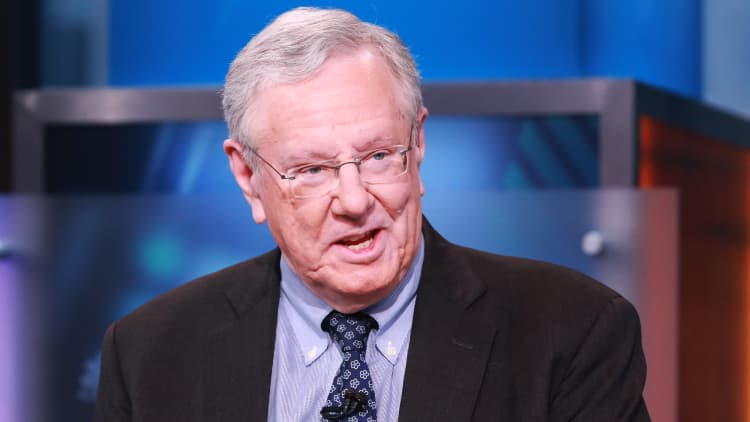
As the Donald Trump train makes its way further along the twisting tracks in Washington, it's finding that the ride can get bumpy.
After all, a president can't do everything by executive order. He has to work with Congress to push through the more complicated legislative items, and in doing so ultimately will encounter the infamous sausage-making process that dominates lawmaking.
The question for Wall Street is whether the improved sentiment and record-breaking market rally can continue if Trump's legislative agenda hits a few walls along the way.
For now, at least, investors seem willing to go along for the ride, so long as it at least appears as if things are moving in the right direction.
"What he has to do and the administration has to do is show that they're making what the market perceives to be meaningful progress," said Randy Frederick, vice president of trading and derivatives at Charles Schwab. "If there is anything that shows a substantial amount of progress and something looks pro-business, I think we'll see the market break out to new highs again."
Concern has risen as some of the key parts of the Trump plan may have to wait, despite aggressive talk from the president.
Trump's magic carpet ride
Repealing Obamacare has taken priority for the Republican leadership, with House Speaker Paul Ryan predicting that tax reform probably will have to wait until at least the spring. Infrastructure spending bills could get pushed through, but the actual work will be months away, if not longer.
The waiting game risks denting high hopes for fast action after Trump began his term with a flurry of executive orders.
The Trump rally actually began a few days before Election Day and, despite some starts and stops, has resulted in the gaining just shy of 10 percent since Nov. 4.
Much of the optimism seems to have come from hopes that Trump will be pro-business, with lower taxes, less regulation and higher government spending on infrastructure, all as part of his "America First" agenda.
However, there's a growing feeling that the economy was ready to break out anyway, and Trump's election cemented a trend that already had been in place. That's actually a positive for the economy, at least insofar as its ability to stand on its own should Trump get bogged down in congressional politics.
"The real wind under Trump's magic carpet is the economic and earnings momentum going on — really not that much to do with him," said Jim Paulsen, chief investment strategist at Wells Capital Management. "We've got data that's coming in here that's been phenomenal for the most part."
That might be a little strong, but the data certainly are improving.
Fourth-quarter corporate profits are up 4.6 percent, with 65 percent of the companies in the S&P 500 reporting, and analysts are expecting 2017 to show earnings growth of 11.1 percent on a 5.8 percent uptick in revenue, according to FactSet.
The economy is picking up as well, with the Atlanta Fed forecasting gross domestic product to climb 2.7 percent in the first quarter of 2017. That would be the fastest first-quarter growth in four years, according to data from the Bureau of Economic Analysis and Haver Analytics.
"That really takes the sting out of whatever is or is not happening around Washington," Paulsen said. "If that fades in any significant way, then the Trump stuff becomes a lot more important."
Confidence measures are high as well, with consumers and businesses showing better-than-forecast optimism. The latest American Association of Individual Investors survey indicates bullishness is at a 12-year high.
Of course, sentiment is a fickle thing. But the markets and economy have shown resilience during a remarkably tumultuous political period.
"The lesson of 2016 is that political shocks often have limited economic consequences," Andrew Kenningham, chief global economist at Capital Economics, said in a note. "Households and businesses in the U.S. may prove quite resilient even if Donald Trump continues to govern in a chaotic manner for months or even years, and even if his economic policies remain unclear."
Markets can, however, be notoriously impatient. They also are well-known for pricing in events at least six months ahead of time.
So if midyear should roll around and there's little movement on tax cuts or other key tenets of the Trump agenda, that could provoke backlash.
Until then, though, both corporate America and investors are willing to be patient.
"The sentiment and attitudes of corporate America have changed. Folks are getting back to a more normal business environment," said Rob Lutts, chief investment officer at Cabot Wealth Management. "All of this leads us to believe that market conditions and a bullish environment can stay with us for some time. It would be hard for the market to completely unwind."


